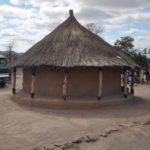In a previous post I talked about the Soweto shanty towns and how people living in such poverty-stricken conditions didn’t fit what I expected. We also had the opportunity to visit a couple of homes during our time on safari, and which gave another preconceived notion a reality check.
First of all, the home visit. Overseas Adventure Travel (OAT), the organizers of our safari, always arrange for people to spend time learning about the local culture and people. When Cathy went on another OAT trip some years ago to China, their group was split up and had dinner in the homes of local families. In Africa, we visited a primary school that OAT supports through donations and gifts in the Botswana town of Hwange, and afterwards we went to a local homestead. An extended family lived there, with the matriarch as our host (only because she had greater facility with English than her husband). They are not particularly a matriarchal society, nor particularly patriarchal either; it seemed to me there was more of a partnership, at least in this particular household.  Anyhow, their home compound was made up of several small buildings, each devoted to a different function (cooking and eating in one, sleeping in another, etc.) The cooking/eating building had a thatched roof (with a hole at the peak), an open cooking fire in the center and a bench around the inside wall. They had a handful of cooking pots and utensils hanging on the wall and a single entry way (no door). The floor was dirt, but the inside was spotless and organized. A couple of other buildings similarly constructed for sleeping for other members of the extended family, a goat pen and a small garden fenced off made up their compound. Their “shower” was a small structure with a door and a fixed faucet on a pole, with no roof. Water was carried from either a faucet or a stream a hundred yards or so away.
Anyhow, their home compound was made up of several small buildings, each devoted to a different function (cooking and eating in one, sleeping in another, etc.) The cooking/eating building had a thatched roof (with a hole at the peak), an open cooking fire in the center and a bench around the inside wall. They had a handful of cooking pots and utensils hanging on the wall and a single entry way (no door). The floor was dirt, but the inside was spotless and organized. A couple of other buildings similarly constructed for sleeping for other members of the extended family, a goat pen and a small garden fenced off made up their compound. Their “shower” was a small structure with a door and a fixed faucet on a pole, with no roof. Water was carried from either a faucet or a stream a hundred yards or so away.
(Full disclosure: one of the other buildings had three very small rooms; two for sleeping, the third for watching TV…Yes, this building had electricity, a TV and a satellite dish…and they had a fairly late model Toyota. Go figure!) We also were told that this was a very typical homestead for Botswana, and furthermore that the majority of the people in the country came from such a village and environment, and still identified that as “home” even if they now lived in a city.
So (in spite of the somewhat anachronistic TV and car): cooking over an open fire, no electricity (at least not in any building except one), no running water and dirt floors.
Still, all in all, if that were here in the US, we would associate it not only with abject poverty but lack of education as well.
In conversation with our guides, we found that they all came from a similar village, whether it was in Botswana, Zambia or Zimbabwe (the three countries we visited as part of our safari). Again, my assumption was to associate that kind of poverty and limited resources with lack of education.  So it came as quite a shock when one of our guides started talking about “symbiotic relationships between the animals, the migratory patterns dictated by the weather and prevailing wind/rainy season, which itself was a result of the southern hemispheric Coriolis effect, and the occasional autotroph found in elephant dung (had to look that one up!) And he was clearly not trying to impress us; this was a highly educated, articulate and knowledgeable man, not just about the bush flora and fauna, but other topics as well. Another of our guides gave us an impromptu but highly informative lesson in southern hemisphere astronomy, pointing out not just the Southern Cross, but explaining in considerable detail how to calculate both true and magnetic south from the arrangement of the stars. Turns out that most of the guides, even though they came from such simple (at least to us) homes, were well-educated; our friend casually discussing autotrophs had spent time in London at school and was clearly comfortable with his knowledge.
So it came as quite a shock when one of our guides started talking about “symbiotic relationships between the animals, the migratory patterns dictated by the weather and prevailing wind/rainy season, which itself was a result of the southern hemispheric Coriolis effect, and the occasional autotroph found in elephant dung (had to look that one up!) And he was clearly not trying to impress us; this was a highly educated, articulate and knowledgeable man, not just about the bush flora and fauna, but other topics as well. Another of our guides gave us an impromptu but highly informative lesson in southern hemisphere astronomy, pointing out not just the Southern Cross, but explaining in considerable detail how to calculate both true and magnetic south from the arrangement of the stars. Turns out that most of the guides, even though they came from such simple (at least to us) homes, were well-educated; our friend casually discussing autotrophs had spent time in London at school and was clearly comfortable with his knowledge.
Another observation: here in the US we take our education and opportunities for granted in a stupefyingly casual way. The kids we spoke with in our school visit I mention above all took their education very seriously. They all intended to go on to college (if they could find the money to do so) and clearly looked at an education as a ticket to a better life. Contrast that with the average school kid here, bored to tears with school and wanting it to simply “be over.” Our dropout rate compared to what we saw in southern Africa does not bode well for our future as a society.
I have to say I’m ashamed at the assumptions and preconceived notions I had before our trip.
